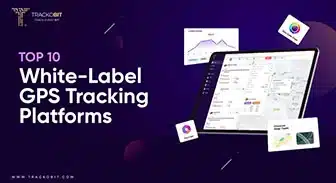-
TrackoBit
Manage commercial vehicles with the new-age Fleet Management Software
TrackoBit -
TrackoField
Streamline your scattered workforce with Field Force Management Software
TrackoField -
Features Resources
-
Blog
Carefully curated articles to update you on industrial trends. -
White Paper
Insightful papers and analysis on essential subject matters. -
Glossary
Explore an alphabetical list of relevant industry terms. -
What’s New
Get TrackoBit & TrackoField monthly updates here. -
Case Study
Explore the cases we solved with our diverse solutions. -
Comparisons
Compare platforms, features, and pricing to find your best fit.
-
About Us
Get to know TrackoBit: our team, ethos, values, and vision. -
Careers
Join the most dynamic cult of coders, creatives and changemakers. -
Tech Support
Learn about our technical support team and services in detail. -
Events
Check out the exhibitions where we left our marks and conquered. -
Contact Us
Connect with us and let us know how we can be of service.
Fuel Savings Are Critical For Small Business Survival
- Author:Ayushi Nagalia
- Read Time:9 min
- Published:
- Last Update: December 9, 2025
Table of Contents
Toggle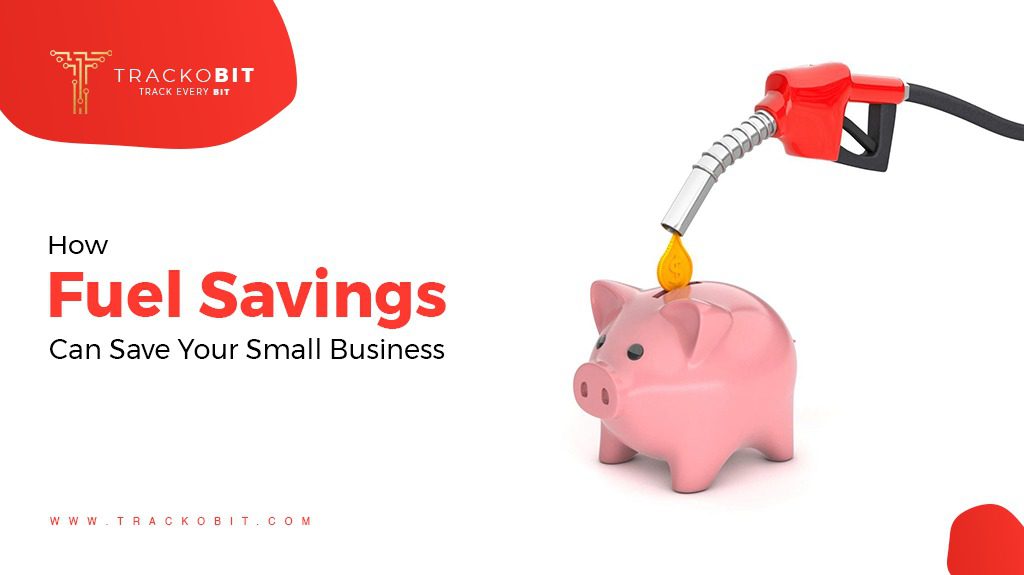
Fuel prices have risen and are on their way to reaching an explosive high in the near future. In such a situation, small businesses find it difficult to cope with the pressure of operational costs.
Table of Contents
Toggle
For any vehicle-centric business, fuel is one of its biggest operational costs.
Small businesses, especially bootstrapped ones, need all the tight budgeting and operational cost cuts possible. However, unfortunately for micro, small, and medium-sized enterprises (MSMEs), the COVID-19 pandemic has only turned the fuel cost situation from bad to worse.
Read this article to know about fuel saving and why it is critical for small businesses to survive. We’ll also offer tips on how they can have tighter but more comfortable fuel budgets with fuel monitoring systems!
How Significant is Fuel Consumption in a Fleet Business?
Speaking on a global level, fuel costs have not been as high as now since over a decade ago. In an ecosystem that encourages startups, building fleet-based businesses is a given. However, due to such high prices, doing so becomes exceptionally difficult.
The average fuel expense of a fleet can take up about 40-85% of operational costs. That is a whopping amount, especially for a small business with limited resources but multiple cost outlets.
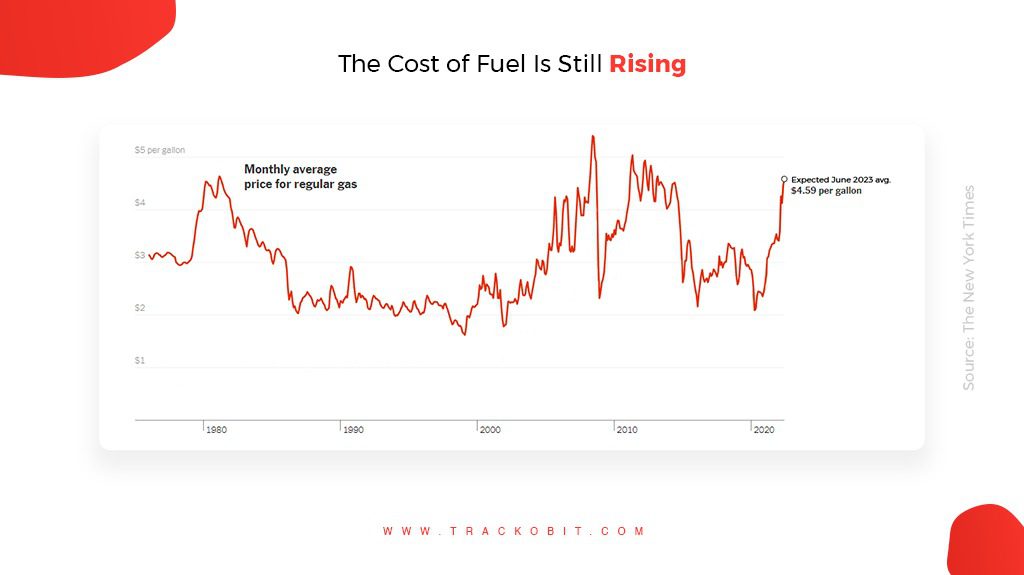
What Causes Wasteful Fuel Consumption?
While the fluctuating and rising fuel prices are a problem, that is not something in the business’ control. However, what is in their control is reducing fuel consumption and wastage. Here are a couple of things that increase fuel consumption and wastage in a business:
Pilferage
Fuel pilferage is an incredibly common practice, especially in long-haul logistics fleets. While this might not come under direct fuel consumption in the fleet, it is the business that has to undertake the cost of pilferage as well.
Inadequate Supervision
Without proper fuel consumption supervision, it is easy to lose track of where the fuel is after being put in your vehicle. Bad supervision leads to excessive waste as well as inadequate resource utilisation, and we don’t want that, do we?
Wrong Routes
If you’re managing your fleet and vehicles manually, planning and managing routes is a special skill you need to have. Without waypoints, a single detour can cost a fleet massive fuel due to the extra kilometres travelled. After all, the only way to save fuel is to drive less, right?
Bad Vehicle Condition
Why do people prefer new vehicles over older ones? Because not only do they look and run in their pristine condition, but also consume the least possible fuel. The poorer the condition an engine is, the worse the fuel consumption will be, so choose and maintain your vehicles wisely!
Inefficient Driving
It is brother too slow, or too fast driving that will increase or decrease your fuel consumption. It is finding the middle ground and hitting those sweet eco-driving spots that will reduce fuel consumption in your fleet. If your driver constantly resorts to harsh braking and acceleration among other things, you’re bound to face extreme fuel consumption in your business.
Overloading
The more your vehicle weighs, the more fuel it will consume. Therefore, while overloading might seem to be profitable, it reduces mileage and does more harm than good – especially from a fuel consumption perspective.
How Does Excessive Fuel Consumption Hurt Small Businesses?
Fuel consumption and increasing fuel prices itself is a huge issues on a global level. However, if we look from a small business perspective, the problem only increases. Why? Because these businesses have limited resources and multiple cost outlets. One of these outlets, that too a prominent one, becoming too expensive doesn’t help anyone.
Here are a few ways excessive fuel consumption hurts small businesses.
- Increases Operational Costs: If your business depends on vehicles to execute most operations, fuel prices obviously increase operational costs. Sure, this is an inevitable cost. But saving drop-by-drop is the best way to keep those operational costs in check. Fuel is not the only cost you have to incur, after all!
- Reduces Overall Profits: Needless to say, the higher the operational costs, the lower the profits will be. The lower the profits, the more difficult it becomes for small businesses to survive in the environment of cut-throat competition.
- Bad Goodwill and Relations: The higher the fuel consumption and operational costs, the more freight costs the business will incur from consumers. This is definitely something customers will not entertain easily. Moreover, in the current ecological environment, fuel consumption also increases the business’s carbon footprint, making the business less eco-friendly, and hence, less desirable in the modern markets.
- The Danger of Collapse: Companies have been hitting insolvency high because of the increasing fuel and energy prices. The situation is so bad that in the UK alone, 53% of small to medium-sized businesses are expected to reduce their activities or collapse.
Tips to Enhance Fuel Saving in Your Fleet
Regardless of which industry your vehicles run in, there are some universal; tips you can follow to ensure that you achieve the maximum fuel savings. Let’s look into them here:
Choose the Shortest Route
Not to sound too cheeky, but the best way to save fuel is by reducing driving. But well, since not running your fleets will cost you more than consuming fuel, you can at least take the shortest routes. Make sure that you choose routes that promote the most fuel savings.
Knock Multiple Doors In One Trip
Why send two vehicles to stop A and B on the same route when one vehicle can go to both places while consuming half the fuel, right? Not only will covering more waypoints on a route save you fuel but also time and a lot of other resources.
Maintain Vehicles Well
Old engines can be real fuel guzzlers. So, as a small business owner, it is your duty to not let them do that to your fleet. Make sure that your vehicles meet ass servicing dates and are in pristine condition before letting them run on the roads.
Practice Eco-driving
There are several eco-driving practices such as slow acceleration and braking, maintaining a certain speed limit, and much more. If you do not want to change routes, drivers, or anything else, practising eco-driving is the only way to boost fuel savings that might save your small business.
Incentivise Drivers
You cannot force anybody to do something unless they themselves want to do it. If you want your drivers to maintain eco-driving practices with your vehicles, you must incentivise them to keep them willing to do so.
Use Technical Aid
All the management and supervision required to actually cut down fuel consumption is not possible manually. The only way you can do so is by using fleet management software with the right tools that automate your fuel-saving process.
Fuel Monitoring Systems and Fleet Management Software to the Rescue!
As we’ve already established in the previous section, using technical aid is crucial to maintain maximum fuel saving for your small business.
After all, you can have all the information you need on what practices will consume the least fuel, etc. However, unless you have the tools to supervise your drivers, plan routes for you, and track your fuel consumption, there is hardly anything you can do.
Here are a couple of solutions that fleet management software offer that can help you increase fuel savings in your fleet.
Fuel Monitoring Systems
If you want to increase fuel savings, the first and foremost solution you have to use is a fuel monitoring system. Through this system, you can track when your vehicles’ tanks were filled and when and how it was ejected or used.
These systems also help you understand how your field is being consumed. A couple of anomalies this system can detect are:
- Pilferage: A sudden drop in the fuel tank level.
- Idling: Fuel consumption is increasing but absolute mileage remains constant.
- Low Average: Absolute mileage and fuel consumption relation is very poor.
This system can give you a real-time view of the fuel consumption of each vehicle in your fleet. In fact, you can also set the system to send you alerts whenever there is a sharp drainable or filling in the tank.
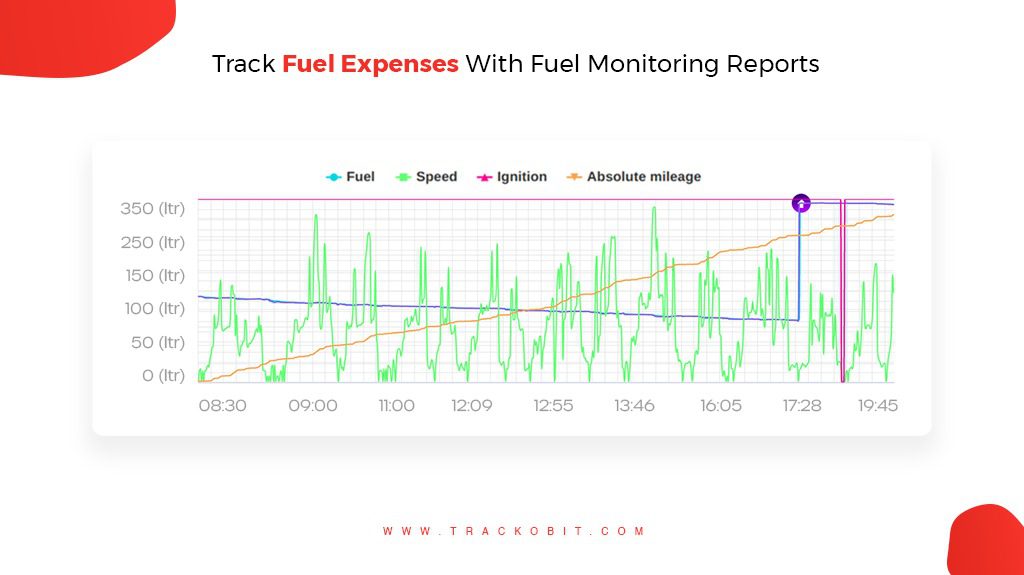
Fuel Tracking Reports
Another segment of fuel management solutions, but important enough to be talked about individually is fuel tracking reports.
If you’re using a potent fleet management software, it will not only give you alerts and views of fuel consumption but will also automatically form analytical reports from that data.
You can find reports for each fuel-related event such as:
- Fuel filling reports
- Fuel ejection reports
- Fuel consumption reports
- Mileage reports
Good fleet management software can go a step further and single out vehicles that are subjected to idling, ill driving, pilferage, and other wrong activities often. You can check historical data to get all the information you need.
Route Management Solutions
Choosing the right routes is just as important as monitoring and analysing fuel consumption for overall fleet fuel savings.
Not always is the shortest route the most economic. Why? Because this route might be uphill, consuming extra fuel, or could be prone to pilferage. This is why you need comprehensive route management solutions. Route planning and optimising solutions will help you find the most fuel-economic routes, even if they seem longer.
These systems also come in handy when they detect and alert managers about route deviations that might cause extra fuel consumption. Some automated fleet management systems might also help you see how much fuel has been wasted in a trip due to deviations alone.
Driver Behaviour Monitoring
Fuel savings are also dependent on how drivers drive their vehicles. Therefore, with driver behaviour monitoring systems, you can monitor your drivers’ driving patterns and find ways to fix them.
Some fuel-draining things you can monitor and correct with the help of a right driving behaviour monitoring system are:
- Idling
- Overspeeding
- Harsh braking and acceleration
- Constant route deviations
With incidental reports about each of these events, you can easily find ways to help drivers adopt eco-driving and hence, help increase fuel savings in your fleet.
Vehicle Maintenance Systems
Fleet management software is often connected to almost all equipment and hardware in your fleet. Therefore, if any of the parts of the vehicle is malfunctioning, the software will know through its sensors. It will then alert you or your fleet manager about these malfunctioning so that they can be fixed immediately.
Some small hardware malfunctions that you might not realise are eating up a lot of fuel are:
- Low tire pressure
- Low performing engine
- Inadequate airflow in the engine
- Malfunctioning spark plugs
The system can also help you keep your vehicles in top-notch condition by keeping a record of scheduled maintenance dates. Therefore, whenever your vehicle is due for maintenance, you’ll get a notification regarding it.
Weight Sensors
Overloading is something that might go unnoticed. After all, sometimes the consignment doesn’t look heavy enough to increase fuel consumption. With the help of weight sensors, you can detect how much load a vehicle is carrying at a given time.
Automated fleet management systems can come in handy to determine if the specific vehicle is taking on more load than it is supposed to.
Save Your Small Business With a Fleet Management System
By now we know how bad excessive fuel consumption is for both the fleet and business. To make your fleet-centric small business thrive, field saving is paramount. This can be achieved through fuel monitoring systems offered by fleet management software.
So, what are you waiting for? Supercharge your fleet and super save field expenses with TrackBit, India’s fastest-growing fleet management software!
Ayushi Nagalia is a Senior Content Specialist at TrackoBit. She is a marketing maverick with a lush background in literature. With years of experience crafting content for various niches, she speciali... Read More
Related Blogs
-
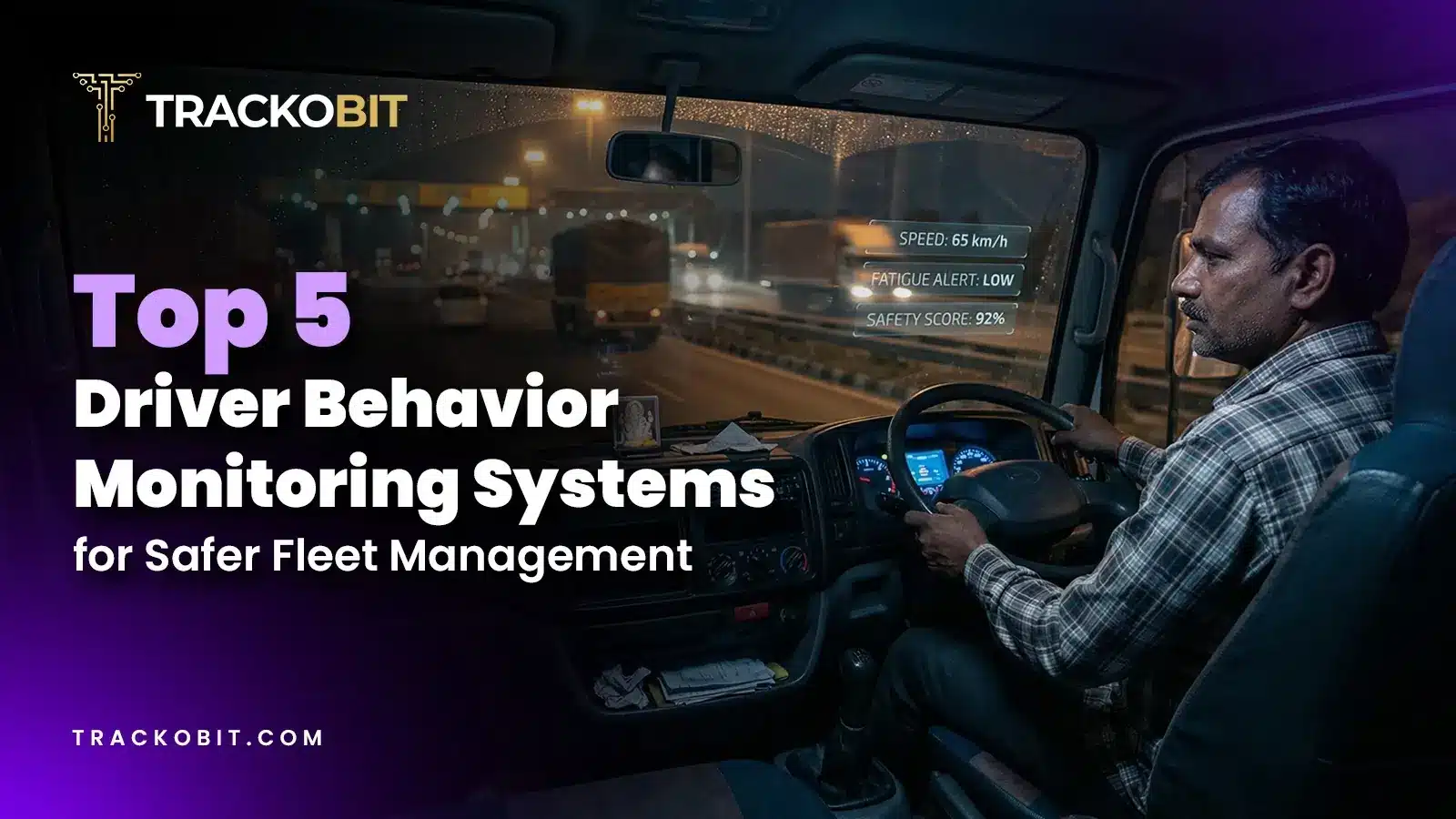
5 Best Driver Behavior Monitoring Systems for 2026
Tithi Agarwal February 23, 2026Having the best driver behavior monitoring system is a necessity as it helps you ensure driver safety and optimize operational…
-
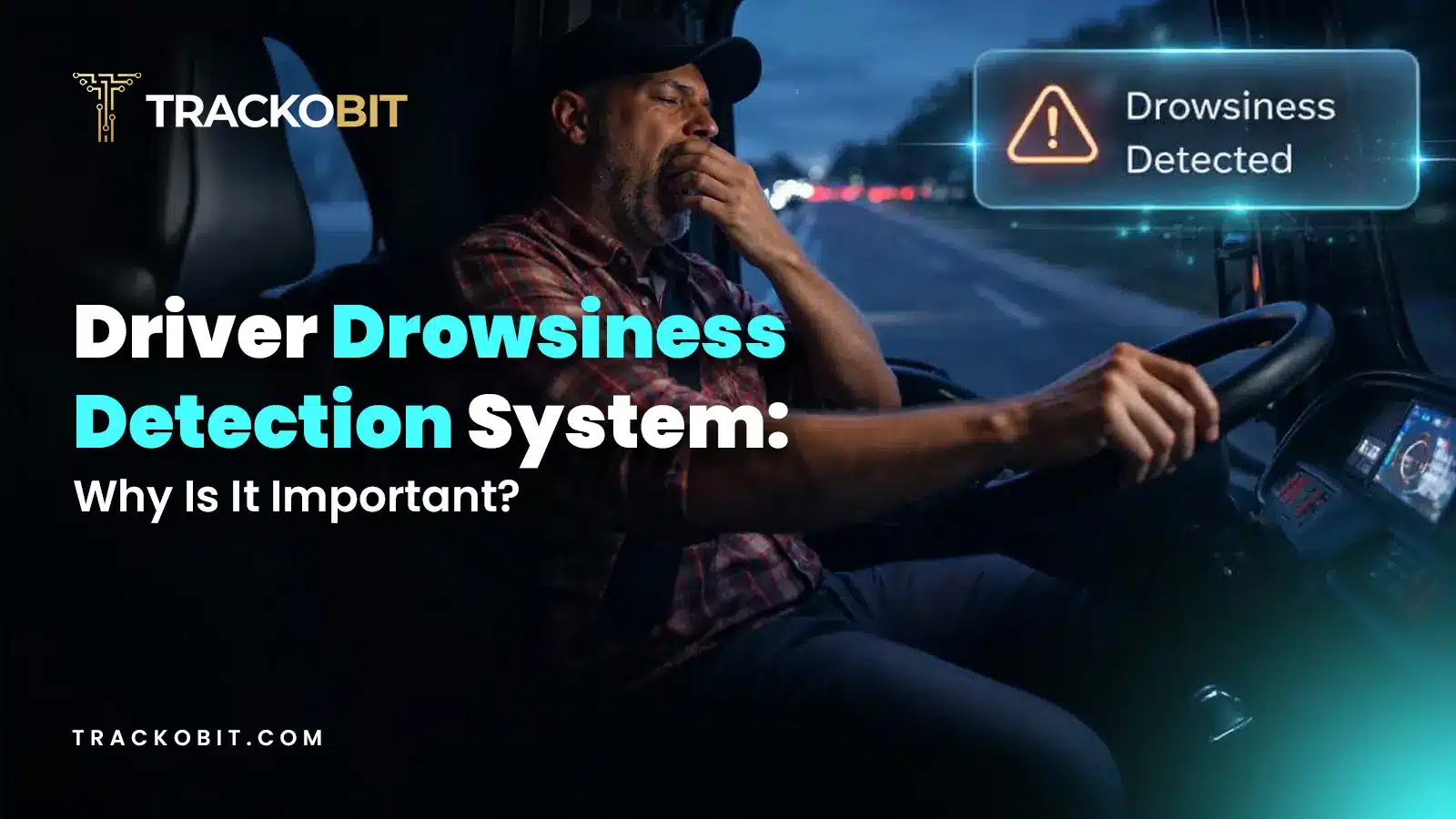
Why is Driver Drowsiness Detection System Important for Fleet Management?
Shemanti Ghosh February 4, 2026A driver drowsiness detection system is critical for fleet management. It helps prevent fatigue-related accidents and reduces operational risks through…
-
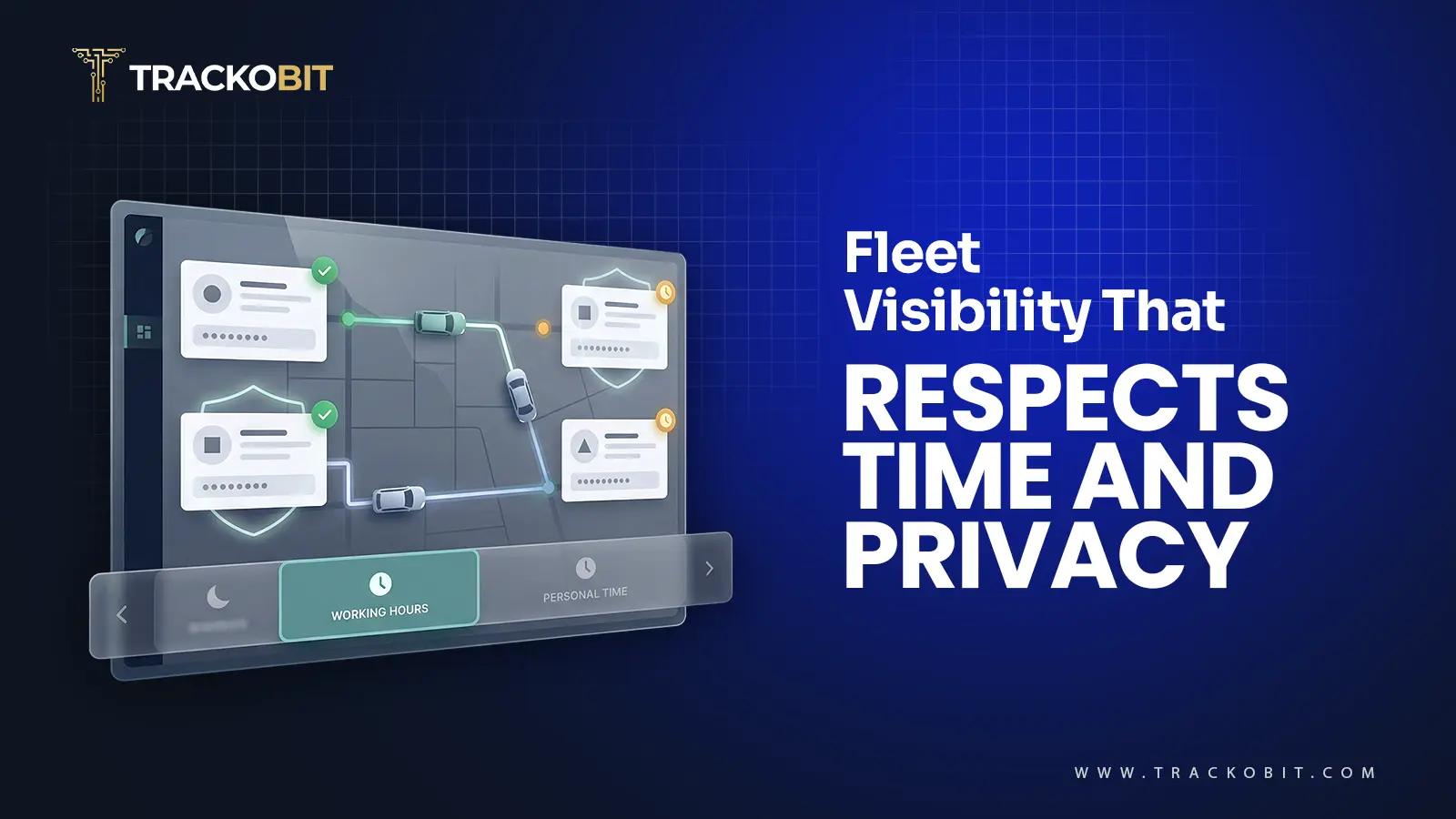
When Tracking Needs a Clock: Rethinking Fleet Visibility
Tithi Agarwal December 24, 2025Read on to understand why fleet tracking works better when it follows working hours. Because visibility should support operations, not…
-

What Makes TrackoBit’s Video Telematics Software Truly Next-Gen?
Shemanti Ghosh December 17, 2025TrackoBit’s video telematics software blends smart video intelligence with full server control. The result? Superior fleet reliability and safety.

Subscribe for weekly tips to optimize your fleet’s potential!
Your inbox awaits a welcome email. Stay tuned for the latest blog updates & expert insights.
"While you're here, dive into some more reads or grab quick bites from our social platforms!"Stay Updated on tech, telematics and mobility. Don't miss out on the latest in the industry.
We use cookies to enhance and personalize your browsing experience. By continuing to use our website, you agree to our Privacy Policy.



































